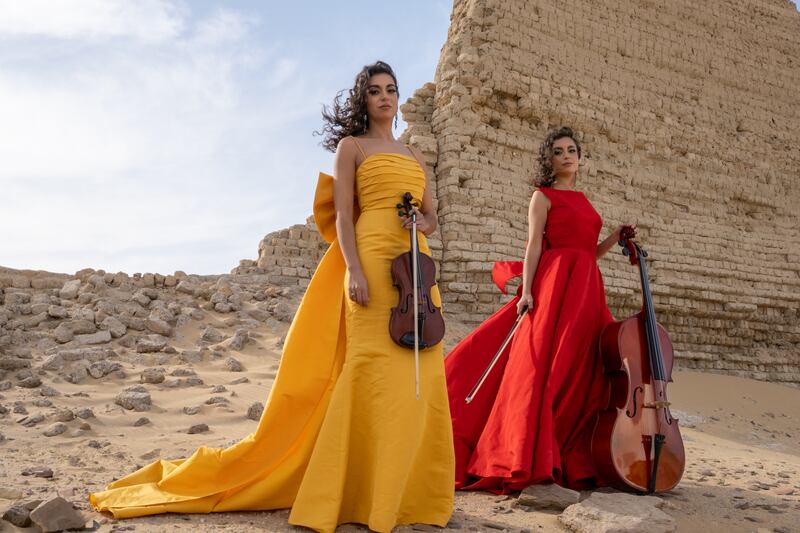Sarah Ayoub's gaze is fixed on the screen embedded in the seat in front as her dexterous hands move, rotate and drop brightly coloured geometric forms descending from the top of the field.
Elsewhere on the plane, Laura Ayoub is at the remote controls, too, equally intent on manipulating the blocks to clear as many lines as possible in a rival game of Tetris on the in-flight entertainment system.
Between attempts, the siblings scan the leader board to see which names are next to the highest scores before resuming their ruthless obliteration of all comers – including each other whenever possible.
The competition seems fierce. “Very!” Sarah, 31, tells The National.
“Absolutely. No shame in admitting that,” Laura, 27, the other half of the Scottish-Egyptian musical duo The Ayoub Sisters, confirms. “We’re not competitive with each other unless we’re playing games. Tetris is a favourite. The card game Conquian is another, and we got into chess during lockdown.”
Their penchant for puzzles is, Sarah says, one of the things they have in common, based on a shared love of thinking laterally, solving problems and anticipating what the other player might do next.
Onstage chemistry
It goes some way to explaining The Ayoub Sisters’ success as multi-instrumentalists and composers as well as their chemistry – on and off stage – as they communicate through the smallest gesture or facial expression.
“When we started lessons and the discipline side of learning music, that’s when the two of us really took to it quickly, as if it were a puzzle,” she explains.
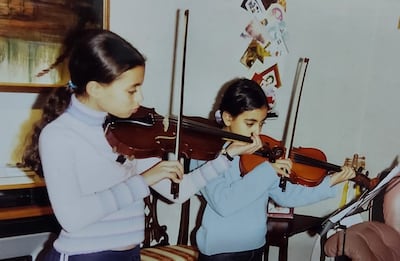
“Now that we’re doing a lot more of our own music and writing our own arrangements, it’s a different kind of problem-solving. You have a feeling or an idea but you need to elaborate it and get from A to B with some kind of bridge that takes everybody with you.
“We need to be careful that we don’t end up talking about music like maths. A lot of it is physics but a lot is subtle things – whether it’s dynamics, whether it’s harmony – that stem from a feeling in here,” she adds, one hand on her heart.
A winning formula
Whatever the exact ratios, it’s clearly a winning formula. In seeking to bring Arabic music to western audiences and, vice versa, classical music to the Arab world through various genres, they have been hailed as the faces of an exciting new generation of so-called crossover artists.
Their latest venture, Arabesque, is a celebration of and tribute to their Middle Eastern heritage and their parents, Hanan and Ashraf, who nurtured their talent from an exceptionally young age.
Hanan, now 58, met her husband through the Coptic Christian church in Cairo and flew to Scotland a week after their marriage in 1990, telling family they’d be back after Ashraf, now 62, completed a doctorate at Glasgow University. “It didn’t end up that way,” Laura says in her strong brogue.

So ill-prepared for the weather were the newly-weds that the local community welcomed them with open arms and winter coats.
“There’s very much a feeling that Scottish people don’t mind going out of their way to help others,” she says. “It’s very similar to the warm culture in Egypt.”
Like child's play
When Hanan, who had studied Egyptology and history and worked as a tour guide in Cairo, found herself with time on her hands in their adopted home, she enrolled in keyboard lessons at night school. She would perch the young Sarah on her lap during practice sessions but was soon surprised to find her daughter was picking up the melodies much faster.
The girls led a relatively sheltered life in the local Coptic community in Glasgow, which consisted of just five families when the Ayoubs moved in, but music was always part of their childhood.
With their nearest church 70km away in Kirkcaldy, the Copts would hire Strathclyde Union Chapel once a month for services, where Sarah vividly recalls the whole mass being sung.

“We grew up listening to these chants and prayers,” she says. “Then, when we’d go to Egypt on holiday, we would hear a very different sonic world coming from the mosques.”
Musical ears on both sides
At the family home in Bearsden, they were immersed in a “bizarre mix” of music – the strains from Classic FM on the radio; performances of Umm Kulthum before an orchestra in her black and white films; Boney M, Queen and Abdel Halim Hafez or Omar Khairat CDs that would spill from the door pockets of their father’s car; vinyls of ABBA, the Sound of Music and Carmina Burana on the record player.
“We’d dance along to the cantata and the thing would skip every time,” Sarah says.
“Both parents were keen listeners. Apparently, our grandma on our dad’s side had a piano but music education wasn’t really something that was championed in the family. There are definitely musical ears on both sides of the family.”

Playing it forward
There can be no doubt that the acuity was handed down to the Ayoub siblings. According to one family legend, Sarah began babbling a “yoo-ya-ya-ya doo-do-do-do’’ rendition of the Hallelujah chorus after being taken to a performance aged three.
“The Handel’s Messiah was definitely Sarah’s shining moment,” Laura says, deadpan. “Our parents were great at taking us to loads of concerts when we were younger."
As Sarah puts it, “You cannot underestimate how music might make someone feel or plant an idea and influence their life, especially children. That's why we always make an effort to go into schools whenever we're playing a concert anywhere in the world.”
By the time they were four and seven, they were enrolled in classes to learn piano and violin before Sarah also took on the cello.
“We wanted to play everything,” says Laura, still with a trace of the enthusiasm that led her to take up the guitar, trumpet and do vocals as well.
Their mother, perhaps fearing for the neighbours’ eardrums, steered them gently away from the louder instruments and recommended that they narrow their focus.
Maladies over melodies
They had their parents’ blessing to attend Douglas Academy School of Music in Glasgow, and Sarah subsequently took up a scholarship offer of joint principal studies in piano and cello at the Royal Conservatoire of Scotland.
But Ashraf, a maxillofacial surgeon, still had high hopes of his youngest daughter choosing maladies over melodies. What followed was two or three conflicted years as Laura wrestled with pursuing medicine to keep her father happy or seeing how far she could progress with the violin and piano.
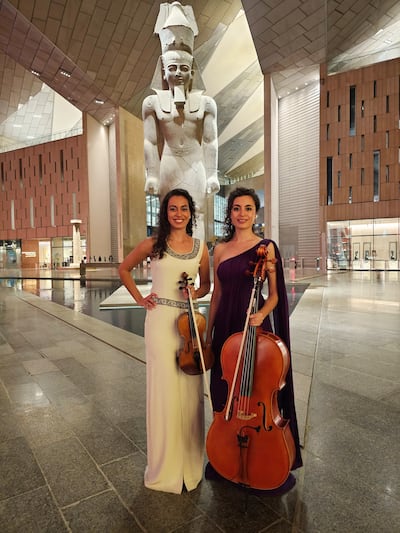
She talks about the work experience in hospitals and meetings with doctors he arranged as attempted persuasion but didn’t “love it, and live and breathe it’’ enough to commit to all the years of study and the work that lay beyond.
“I humoured him and myself,” she says. “It wasn’t until the Royal College of Music in London offered me a place that I thought: ‘I have to see this through.’
“He was disappointed and worried because neither of our parents knew what a career in music looked like. When I told him I was doing music and moving to London at 17, I hurt him twice.”
Sarah followed shortly after graduating with first-class honours from the conservatoire in 2014, and the two found themselves harking back to the tunes they had grown up with while jamming together in their two-bedroom flat in Wimbledon.
During one such session, riffing on the cello and violin, they recorded a version of Uptown Funk by the DJ and super producer Mark Ronson on an iPhone.
After some hesitation about what others in the classical field would make of them playing pop music on string instruments, they uploaded the “primitive” video to YouTube and Facebook.
A pinch-me moment
The performance was viewed only 10 or so times in the first week, "mostly our mum”, but crucially once by Ronson himself, who, as part of MasterCard’s Priceless Surprises Brits 2016 campaign, was looking for unique covers of the hit to record a new version in Abbey Road Studios. The Ayoubs' effort was one of the four chosen.
“It was a pinch-me moment,” says Laura. “We loved it and that’s definitely why we ended up going down the classical crossover route. Though for some reason I don’t like the word crossover. I think maybe because the genre as a whole has quite a bad rep.”
The recording was played at that year’s awards ceremony to a worldwide televised audience of nearly six million, and their star was on the rise.
At around the same time, they decided it was logistically easier to enter Classic FM’s Big Music Project together as The Ayoub Sisters with one video instead of going head to head in two, with the proviso that both were showcased as equals.
They won, leading to a performance at the Royal Albert Hall in London, a deal with Decca Records and an eponymous debut album in 2017 that premiered at No 1 in the UK’s official classical charts, featuring a cover of Michael Jackson’s Billie Jean, Melodies From Scotland and Call to Prayers (A Message of Unity) inspired by the adhan and the Coptic Orthodox Liturgy.
The sisters began writing the compositions for Arabesque – a blend of original work, folk songs and regional melodies with Celtic and Arabic influences – at the same time as performing as part of a quartet with a guitarist and percussionist. “It was an itch,” says Sarah.
'We own it'
They parted company with Decca by mutual agreement, feeling strongly that the new album should be an independent release but, looking back, both concede it was their biggest endeavour so far.
“When it comes to what needs to be done to record and release an album, it’s a mammoth task but we were confident we wanted to do it,” Laura says. “That way, at the end of the day, it’s ours. We own it. Which is not something you can say often in this industry.
“We’re both so proud of it. This album is about a cultural exchange and speaks to our heritage.”
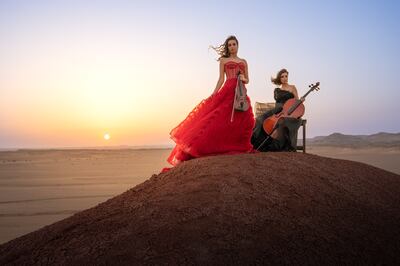
The success has led to loans of beautiful gowns for performances, such as those designed by the luxury Egyptian couture house Maram Borhan that were worn standing on sand dunes for the latest album cover, and the 1810 J Gagliano violin from world-leading dealers and restorers Florian Leonhard.
Fast movement
There was a heart-stopping moment when Laura once left the £100,000 ($127,000) instrument on the luggage rack of a train but managed to retrieve it at the next stop after giving chase with a redoubtable Uber driver. “I’m never putting it in there again,” she says, her relief still evident.
Living under the same roof makes the process of collaborating easier, Sarah says, although that is not to say that difficulties don’t arise from “being in each others faces” while working, rehearsing, recording and eating in their living room.
Separate bathrooms have been vital to keeping the peace as well as a division of labour, with Sarah cleaning and Laura preferring to cook, and trying to have boundaries like not talking shop, sending emails or planning meetings after 10pm.
With Laura a mediator who admits to being a bit of a pushover on occasion and Sarah “sometimes going to the other extreme”, they recognise the need for healthy time apart to balance out their personalities.

Though she hasn’t managed to indulge it much lately because of their erratic schedule, Sarah enjoys salsa dancing or eating out with friends, while Laura finds that trips to the gym help regulate her emotions.
“Mentally and physically, I’m a much better person when I’m going there regularly,” she says. “It’s my place to go that I will not find Sarah because she will never, ever in her life be in the gym.”
“Never!” agrees Sarah, laughing.
If they have described themselves in the past as yin and yang, then they have proven to be an interconnected force to be reckoned with. They have toured Arabesque across the Middle East, performing in Dubai, Kuwait and in the Cairo Opera House their parents used to frequent. “It was like a homecoming,” Laura says.
Next month, they will play at the Liverpool Arab Arts and Cambridge Folk festivals in the UK, with more dates in the pipeline.
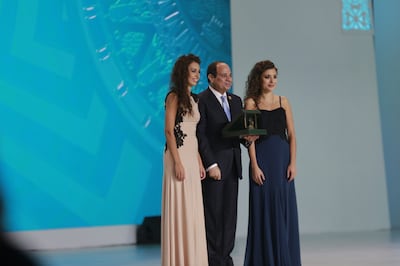
In for a surprise
But has it all – winning a London Arabia Organisation’s Arab Women of the Year award; appearing at the Last Night of the Proms; collaborations with the Cairo Symphony and English National orchestras; and performing before King Charles III in Braemar – been enough to convince their professorial father?
By way of answer, the girls share the story of the time they went with Hanan to the closing ceremony of the World Youth Forum in 2018 in Sharm El Sheikh, advising Ashraf to keep an eye out on television in case he could spot them in the crowd.
What the sisters hadn’t mentioned was that not only were they due to take the stage to play the national anthem but were also to receive an accolade for contributions to music from Egyptian President Abdel Fattah El Sisi.
“We purposefully didn’t tell him as a surprise,” Laura says. “Obviously, we didn’t see his reaction but he was very emotional. I remember speaking to him afterwards. That was when I finally managed to make a joke about it.
“It was a moment of having just a little bit of closure that I might have made the right decision because it was such an honour. I said: ‘Do you think I would have met the President if I had become a doctor?’”
For the record, Ashraf laughed.
The Ayoub Sisters will perform on Family Day at the Liverpool Arab Arts Festival, free entry at Sefton Park Palm House, Arabartsfestival.com for stage timings, on July 16, and at the Cambridge Folk Festival on July 28.
